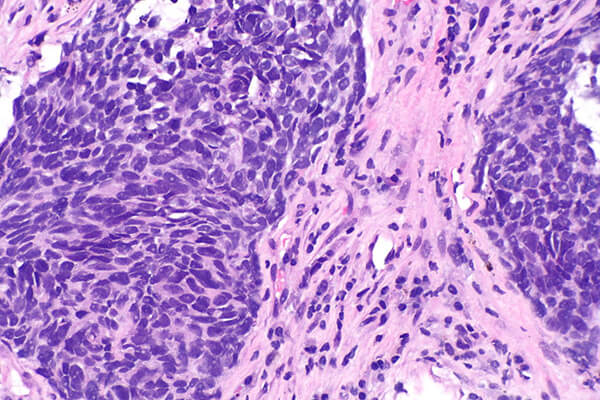
FDA Expands Approval of Pembrolizumab for First-Line Treatment of Non-Small Cell Lung Cancer
June 6, 2017, by NCI Staff
The Food and Drug Administration (FDA) has granted accelerated approval to the immune checkpoint inhibitor pembrolizumab (Keytruda®) for use in combination with chemotherapy as a first-line treatment for patients with metastatic non-small cell lung cancer (NSCLC).
On May 10, the drug was approved to be used with pemetrexed (Alimta®) and carboplatin for patients with previously untreated advanced nonsquamous NSCLC, regardless of whether their tumors express the protein PD-L1.
PD-L1 on tumor cells suppresses immune activity by binding to another protein, PD-1, on T cells; pembrolizumab prevents this interaction by binding to PD-1.
Pembrolizumab was previously approved for two other indications in NSCLC: as a first-line treatment for metastatic NSCLC with expression of PD-L1 on at least 50% of tumor cells, and as a second-line treatment for patients with metastatic NSCLC that has progressed after platinum-based chemotherapy and with PD-L1 expression on at least 1% of tumor cells.
For both of these indications, PD-L1 expression levels must be determined by an FDA-approved test. The latest approval does not require measuring PD-L1 expression levels.
This new approval for pembrolizumab is one of the latest in a series for the drug. In the last 2 months pembrolizumab was approved for the treatment of some patients with bladder cancer and Hodgkin lymphoma, and, in a first, for patients with any tumor type that has either of two types of mutations that disrupt DNA repair. It has also been approved for the treatment of head and neck cancer and melanoma.
Checkpoint inhibitors are increasingly being used to treat NSCLC. In addition to this new approval for pembrolizumab, atezolizumab (Tecentriq®) was approved in October for metastatic NSCLC, and in 2015 nivolumab (Opdivo®) became the first immunotherapy drug approved to treat lung cancer.
Immunotherapy Plus Chemotherapy
This new approval of pembrolizumab was based on the results of a phase II clinical trial of 123 patients with advanced or metastatic nonsquamous NSCLC without mutations in the EGFR gene or alterations in the ALK gene, for which there are existing targeted therapies. Patients in the trial had not been treated previously and were randomly assigned to receive either pembrolizumab plus chemotherapy or chemotherapy alone.
In the trial, 55% of the patients who received pembrolizumab and chemotherapy had at least a partial response to the treatment, compared with 29% of patients who received chemotherapy alone. Median progression-free survival for the two groups was 13 months and 8.9 months, respectively.
The most common severe side effects among patients who received pembrolizumab with chemotherapy included fatigue, dyspnea (shortness of breath), and nausea. More patients in the pembrolizumab group had side effects than patients in the chemotherapy-alone group. Pembrolizumab was discontinued for 10% of patients because of severe side effects, most commonly acute kidney injury.
Researchers further analyzed the patients by how much PD-L1 their tumors expressed, defining subgroups by patients whose tumors had PD-L1 expression in less than 1% of cells and those with expression in at least 1% of cells. But because of the small sample sizes of each group, the researchers wrote, more studies are needed to assess the relationship between PD-L1 expression and response to treatment with pembrolizumab plus chemotherapy.
Gregory Riely, M.D., Ph.D., an oncologist at Memorial Sloan Kettering Cancer Center who was not involved in the trial, said there has been some controversy over this latest approval because it isn’t based on identifying biomarkers in patients’ tumors.
“My fear is that making this combination of immunotherapy plus chemotherapy available to basically all patients with nonsquamous non-small cell lung cancer lessens the pressure to develop biomarker testing in all patients,” Dr. Riely said.
If this happens, he explained, patients who won’t benefit from the immunotherapy drug might receive it, and patients who won’t benefit from chemotherapy will get it.
For example, he said, “of the population of patients who would be eligible for this [new indication], about 30% have [tumors with] very high PD-L1 expression.” In the clinical trial that led to the earlier approval of pembrolizumab as a first-line therapy for NSCLC with high PD-L1 expression, it was shown that these patients benefit more from pembrolizumab alone than from chemotherapy.
Continued Research
With an accelerated approval, FDA requires further studies to be conducted to confirm the clinical benefit for the indication. The trial on which this approval was based was relatively small, Dr. Riely noted.
Initial results from a phase III trial with an expected enrollment of 570 patients are expected within the next year, “so we’ll know more about whether these [phase II] results are confirmed very shortly,” he said.
He noted that there are several upcoming trials exploring the roles of immunotherapy, chemotherapy, and the combination of the two, so while “the data from this trial carry the day today,” he said, “over the coming year we’re going to learn a lot more about whether this combination approach makes good sense.”



































No hay comentarios:
Publicar un comentario